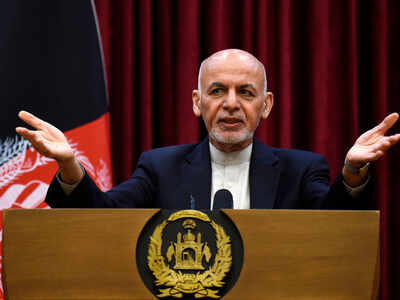
ISLAMABAD: The US-Taliban peace agreement hit its first hurdle with Afghan president Dr Ashraf Ghani on Sunday saying that his government was not committed on the release of 5,000 insurgent prisoners, one of the key components of the peace deal that was signed in Doha in Qatar on Saturday amid the presence of representatives of several countries.
According to the US-Taliban agreement, up to 5,000 Taliban prisoners should be released by March 10 in order to facilitate the intra-Afghan negotiations. March 10 has been slated as a date for commencement of the intra-Afghan dialogue, involving Taliban, a delegation of Afghan government and representatives of the Afghan society, reportedly in Oslo. The Taliban would release up to 1,000 prisoners. Until recently, the Taliban had refused to speak to the Western-backed Afghan government, saying it was a “puppet regime”.
America has said a planned US troop withdrawal over the next 14 months is linked to the Taliban's counter-terrorism performance, not to progress in intra-Afghan talks.
Addressing a press conference in Kabul, the Afghan president criticised the US-Taliban deal, saying an agreement that was signed behind closed doors will have basic problems in its implementation “tomorrow”.
Ghani said that Washington was not authorised to speak, discuss or agree with Taliban on release of prisoners. “Any prisoner release is not in the authority of the US. It is the authority of the government of Afghanistan to make any such decision,” Ghani said, adding that there was no commitment to the release of 5,000 Taliban prisoners.
Ghani said the release of prisoners cannot be considered a precondition for intra-Afghan talks. It can be part of the negotiations, he remarked.
Speaking about the negotiating team, which will attend the intra-Afghan negotiations, Ghani said the government’s delegation will represent Afghanistan’s basic values. “The effectiveness of the team should be considered when it comes to the number of its members,” he said. Ghani also clarified that the authority of government’s negotiating team would be limited.
“The authority of the delegation is limited because the ultimate decision-maker, according to the constitution, is either the parliament or the Loya Jirga (Grand Council) of Afghanistan or a referendum,” the Afghan president said.
When asked whether he will be able to announce a negotiating team before March 10, Ghani said the discussions about a negotiating team have already begun and it will be formed within the next nine days.
Ghani also stressed on the importance of sustaining the republic system in Afghanistan. “There is a clear necessity for all to focus on the republic – not the presidency – when it comes to talks with the Taliban,” he said.
The president hoped that the “reduction in violence” will become a ceasefire.
A week-long reduction in violence between the Taliban, the US and Afghan security forces saw a sudden drop in violence and casualties across the country after taking effect on February 22.
The US-Taliban deal is being seen as a historic opportunity to extricate the US from Afghanistan, a nation convulsed by conflict since the Soviet invasion in December 1979. Yet it could also unravel quickly, particularly if the Taliban fail to deliver on a promise that no terror attacks would be launched from Afghan soil.
The intra-Afghan talks between squabbling political factions and rival Taliban in Afghanistan are even more intricate - even if a potential failure might not slow the withdrawal of American forces.
In an interview with Associated Press, Qatari foreign minister Mohammad bin Abdulrahman Al Thani said he considered a prisoner exchange an important confidence-building measure. “Everything is interconnected,” he said on Sunday about the agreement’s 14-month time-frame.
“The prisoner exchange will be one of the first confidence-building measures, so it will remain a very critical step that we need to push forward,” he added.
According to the US-Taliban agreement, up to 5,000 Taliban prisoners should be released by March 10 in order to facilitate the intra-Afghan negotiations. March 10 has been slated as a date for commencement of the intra-Afghan dialogue, involving Taliban, a delegation of Afghan government and representatives of the Afghan society, reportedly in Oslo. The Taliban would release up to 1,000 prisoners. Until recently, the Taliban had refused to speak to the Western-backed Afghan government, saying it was a “puppet regime”.
America has said a planned US troop withdrawal over the next 14 months is linked to the Taliban's counter-terrorism performance, not to progress in intra-Afghan talks.
Addressing a press conference in Kabul, the Afghan president criticised the US-Taliban deal, saying an agreement that was signed behind closed doors will have basic problems in its implementation “tomorrow”.
Ghani said that Washington was not authorised to speak, discuss or agree with Taliban on release of prisoners. “Any prisoner release is not in the authority of the US. It is the authority of the government of Afghanistan to make any such decision,” Ghani said, adding that there was no commitment to the release of 5,000 Taliban prisoners.
Ghani said the release of prisoners cannot be considered a precondition for intra-Afghan talks. It can be part of the negotiations, he remarked.
Speaking about the negotiating team, which will attend the intra-Afghan negotiations, Ghani said the government’s delegation will represent Afghanistan’s basic values. “The effectiveness of the team should be considered when it comes to the number of its members,” he said. Ghani also clarified that the authority of government’s negotiating team would be limited.
“The authority of the delegation is limited because the ultimate decision-maker, according to the constitution, is either the parliament or the Loya Jirga (Grand Council) of Afghanistan or a referendum,” the Afghan president said.
When asked whether he will be able to announce a negotiating team before March 10, Ghani said the discussions about a negotiating team have already begun and it will be formed within the next nine days.
Ghani also stressed on the importance of sustaining the republic system in Afghanistan. “There is a clear necessity for all to focus on the republic – not the presidency – when it comes to talks with the Taliban,” he said.
The president hoped that the “reduction in violence” will become a ceasefire.
A week-long reduction in violence between the Taliban, the US and Afghan security forces saw a sudden drop in violence and casualties across the country after taking effect on February 22.
The US-Taliban deal is being seen as a historic opportunity to extricate the US from Afghanistan, a nation convulsed by conflict since the Soviet invasion in December 1979. Yet it could also unravel quickly, particularly if the Taliban fail to deliver on a promise that no terror attacks would be launched from Afghan soil.
The intra-Afghan talks between squabbling political factions and rival Taliban in Afghanistan are even more intricate - even if a potential failure might not slow the withdrawal of American forces.
In an interview with Associated Press, Qatari foreign minister Mohammad bin Abdulrahman Al Thani said he considered a prisoner exchange an important confidence-building measure. “Everything is interconnected,” he said on Sunday about the agreement’s 14-month time-frame.
“The prisoner exchange will be one of the first confidence-building measures, so it will remain a very critical step that we need to push forward,” he added.
Download The Times of India News App for Latest World News.
Get the app









